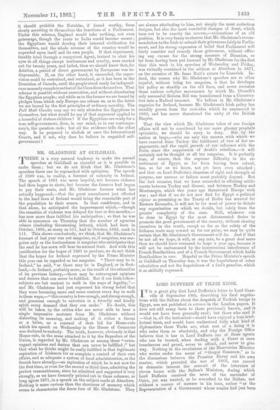TOPICS OF THE DAY.
THE RADICALS ON EGYPT.
TOED DUFFERIN will find that some of his most embar- rassing difficulties are at home, and one of them is the existence among many Radicals of a generous, but we fear im- practicable idea. A good many of them, including one or two men of influence, are represented by the Pall Mall Gazette, which contends, with constantly increasing clearness, for the settlement of Egypt upon what may be most fittingly termed the Belgian plan. Europe is to purchase the independence of Egypt from the Sultan, who could without dereliction of duty yield to its award as to force majeure, is to neutralise the Valley up to a certain point, and is then to leave the Egyptian Government and people to work out their own destinies,— or, as Mr. Courtney put it, "to stew in their own juice." Interference by any Power whatever, on any ground, would be formally prohibited, even, as we understand the plan, if insurrection upset the Khedive's Throne. Egypt, in fact, would be honestly and frankly left to the Egyptians ; while they would be relieved from the European and Turkish pres- sure, which has, in different ways and different degrees, so long prevented their own natural development. We admit, to begin with, that there is something very attractive about this plan. Not only would it sweep away many difficulties which now impede the path of English Liberals, and release this country from a burden which may yet tax the "weary Titan" heavily, but it would set on foot an experiment of the highest political interest. Hardly any question is so important to the Europe of to-day as to discover whether it is one not possible for an Asiatic State hitherto held down by an armed caste, as Egypt, for example, has been held for thousands of years, to manage its own affairs, without anarchy and without tyranny so dreadful as to compel the interference of the more civilised world. That question will be pressed on us in the sharpest way, as the Slow decay of Ottoman power, now nearly complete in Europe, extends itself to Asia ; and if it could be decided in the affirmative in Egypt, Europe would gain greatly,in release from responsibilities. Erzeroum, Broussa, Damascus, Baghdad, Mecca, might all become the capitals of self-governing and prosperous States, with civilisations which might attract their people far more than what they deem the leaden monotony of European ways. But while we admit this feature in the project, we deny both its practicability and its con- sistency with any genuine political morality. his not practicable, because England cannot for generation after generation warn off all Europe and the whole Mussulman world, from a rich, weak, and disorderly State, which it yet refuses to govern ; and it is not moral, because those who would secure the independence of Egypt know that it would mean ruin to the people. If Egypt were Belgium, this would be the plan to be tried, because, even if it did not succeed, there would antecedently be every reason to expect success. But we deny the right of Great Britain, or any civilised State, after conquering a country like Egypt, and pledging herself to secure good government, to make it the subject of an experiment which every man competent to judge knew from the beginning would be a horrible failure. Leaving aside the general ques- tion whether Asiatics do not absolutely require the education of a century's submission to law, before they can construct decent governments, and whether, as Mr. Finlay argued throughout his "History of Byzantium," a period of rigid order is not indispensable to create the national wealth without which the material conditions of pro- gress, such as roads, cannot be maintained, we should say certainly that in Egypt true self-government, government without guidance except from within, is as yet impossible. There are not the materials. The body of the people are in that stage of development in which, while they cannot resist tyranny, they can yield to tyrants splendid fortunes. The upper classes are in that stage in which tyranny seems to them not only a necessary means of government, but for them- selves an enjoyable one. An obedient Army, just Courts,
unbribable officials, could not be secured. The rulers would govern as Turkish Pashas govern, that is, would slowly destroy the people, with this aggravation, that whereas in Turkey, from the exhaustion of the provinces, plunder is ceasing to pay, the Egyptians cannot fly, or cease to extract the wealth inherent in the marvellous fertility of their million of acres of mud seventy feet deep. From the days of the Turkish conquest, the Government of the Egyptian Fellaheen
as been what Mr. Glacletoue called that of Naples under the
Bourbons, "the negation of God erected into a system," the enslavement by the lash of a whole people, for the pecuniary profit of less than two thousand villains. The little and. partly unreal improvement introduced of late by the Con- trol was due to European supervision, without which all, the abuses described in Mr. Senior's recently-published letters would instantly return. The Government of Egypt, non-interference once assured, would either sink into mere anarchy, during which the people would be robbed equally by their Judges, by brigands, and by Bedouins ; or if a new leader suddenly arose, would be a military despotism of a most crush- ing kind. Any ruler of Egypt, Tewfik included, if separated from Turkey, would dread Mecca, the Soudan, the Abyssinians,. and his own people, and, repudiating the Debt as his first act,. would apply the revenue so acquired to the formation of an irresistible body of mercenaries, who would swallow all resources as completely as the Bondholders do, and would govern by sheer terror and oppression. There is no tyranny like that of an armed caste among a sub- missive people, and its rule would, in Egypt, be absolutely inevitable. No Council of Notables, no grant of representation to the villages, would stay its hand for a moment ; and there would be no one in the world to control it, except Europe, which would either demoralise itself by witnessing atrocities without interfering, or would, in a burst of horror, abandon the experiment, so reviving, under worse conditions, the situa- tion of which the Pall Mall Gazette complains, The keenest interests of the greatest Powers bind them to let Belgium alone, but if Belgium became a cesspool of cruelty and the Alsatia of Europe, as Egypt would, even Belgium would in three months be garrisoned in the interests of civili- sation. The Pall Mall Gazette says we do let Turkey alone, and so—not always to our credit—we do ; and the result is that Western Asia is exploite' to secure luxury to a Ring of Pashas compared with whom a ring of speculators is' soft-hearted, and is slowly dying away, till whole provinces are abandoned to the brigands, and, except among the armed. Ottoman caste, no man's property and no woman's honour are safe for a week.
Like our Radical friends, we are most desirous that the experiment of autonomy in Egypt should be tried ; but unless England is to break faith in a most gross way, it must be under conditions which make the continuous good govern- ment of the people not only possible, but fairly certain ; and there is, as we conceive, but one plan which will secure the double end. Like the Pall Mall Gazette, we would, under the sanction of Europe, purchase the Sultan's rights ; but we would transfer them to the Queen, under a distinct, written promise to make of Egypt an autonomous, though subordinate, State. We would sell all the unmanageable Khedivial domains, the State Railways, and all State pro- perty available, and with the proceeds pay off the Bonds, at the rate of 75 per cent. of their nominal value,—a proposal which would be instantly accepted by all except the Prefer- • ence Bondholders. We would dismiss as leniently as might be, but firmly, all unnecessary Europeans in Egyptian State service, prohibit the employment of foreign Asiatics, and select an Egyptian Premier of capacity to organise the Administration. We would retain in Egypt a single Agents of the rank and type of Lord Dufferin, who, with the whole authority of the Protecting Power, would secretly advise with that Premier, and who would direct his efforts to two distinct ends,—the adoption of a Code of Law, which must not be violated; and the steadily severe punishment, not by dismissals, but by sentences of penal servitude, of every official, from the Commander- in-Chief to the lowest policeman, who accepted a bribe. Subject to those two immutable conditions, action on private individuals through law, instead of Pashas' will, and the purity of the Executive, we would have this Agent interfere as little, except on a European demand—such as might arise in the case of a murder of Frenchmen or Italians—as the British Resident interferes in the more distant provinces of the Nizam's Dominions. He should advise only, and that as little as possible, should not interfere with Egyptian politics or Egyptian careers, and should have no control whatever of the direct kind over the Egyptian Army, which should be purely and frankly native. His single instrument should be the right of the Paramount Power, on sufficient cause shown, sufficient cause being the decline of the country, to dismiss the Premier, or even ta raise a new family to the subordinate Throne. Of course, any scheme of Deliberative Councils or local self-government would be consistent with the position ; nor do we see why.
it should prohibit the Notables, if found worthy, from slowly accreting to themselves the functions of a Parliament. Under this scheme, England would take nothing, not even patronage, though the route to India would become secure ; the Egyptians would develop their internal civilisation for themselves, and the whole revenue of the country would be expended upon itself and its own people. If that experiment, frankly tried through a competent Agent, trained to shut his eyes to all things except lawlessness and cruelty, were carried out for twenty years, and failed, then we should know that, for Asiatics, a period of direct government by Europeans was in- dispensable. If, on the other hand, it succeeded, the super- vision could be restrained, and restrained, as it has been in the Dominion of Canada, until the people stood ready for independ- ence as nearly complete as that of the Canadians themselves. That scheme is possible without annexation, and without abandoning the Egyptian people ; and while as to the former we are bound by pledges from which only Europe can release us, as to the latter we are bound by the first principles of ordinary morality. The Pall Mall Gazette may say we only abandon the Egyptians to themselves, but what would he say of that argument applied to a houseful of riotous children? If the Egyptians are ready for a true self-government, then, in our mind, as in our contempo- rary's, the question ends ; but all the evidence tells the other way. Is he prepared to abolish at once the International Courts, and if not, why does he believe in unguided self- government ?







































 Previous page
Previous page